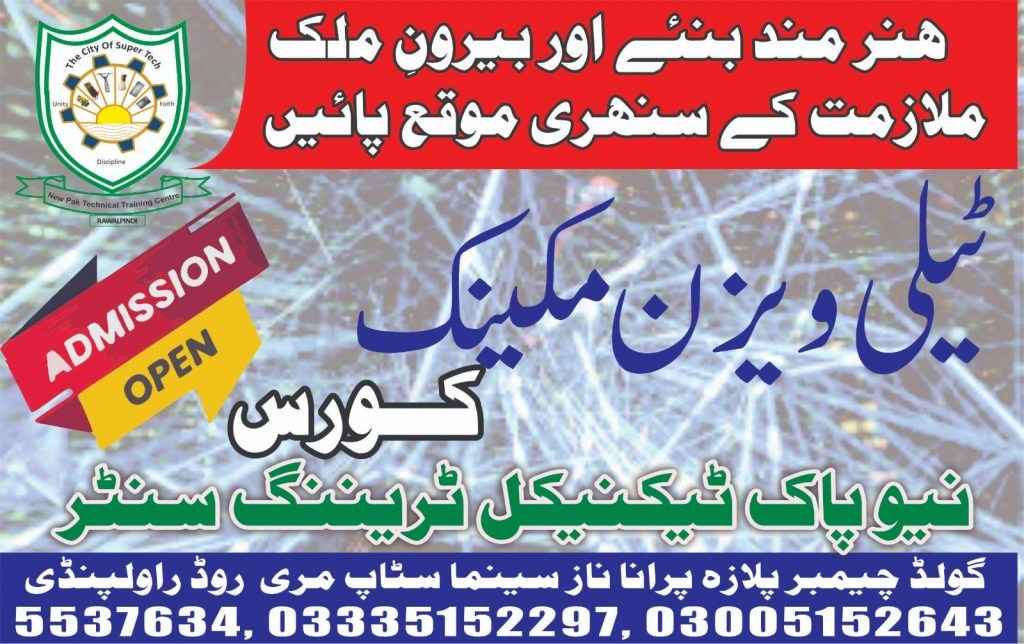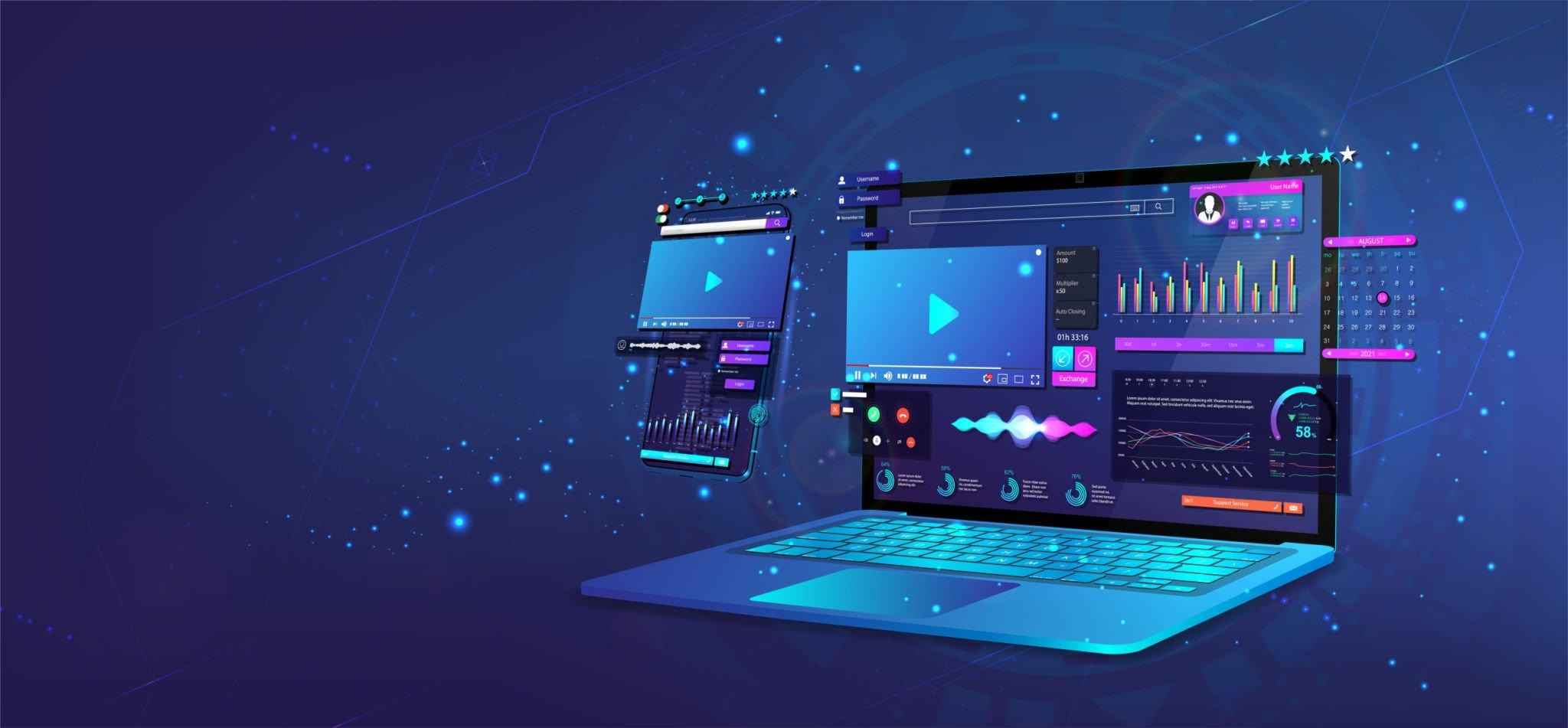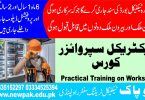
Television Mechanic Course in Rawalpindi Islamabad
The Television Mechanic Course equips learners with hands-on skills to diagnose and repair faults in television sets and related electronic equipment. Students learn to trace issues caused by heat, moisture, or wear using specialized tools, wiring diagrams, and testing devices, preparing them for both workshop and field service environments.
Course Overview
This practical training covers TV fault detection, component repair, antenna setup, and basic stereo system servicing. The television mechanic course blends theory with field practice, ideal for those aiming to build a career in electronic repair and home service operations.

Course Duration
06 | Months
- Types & Technology of Televisions
- TV Structure, Resolution & Safety Tools
- Basic Electronics & Soldering
- Circuit Reading & Multimeter Use
- Power Supply & Board Diagnosis
- Common Fault Troubleshooting
- Smart TV Software & Firmware Handling
- Real-World TV Repair Practice
01 | Year
- Types & Technology of Televisions
- TV Structure, Resolution & Safety Tools
- Basic Electronics & Soldering
- Circuit Reading & Multimeter Use
- Power Supply & Board Diagnosis
- Common Fault Troubleshooting
- Smart TV Software & Firmware Handling
- Real-World TV Repair Practice
- Advanced Electronics & Signal Tracing
- LED/LCD Panel Repair & Calibration
- Smart TV OS Repair (Android, WebOS, Tizen)
- Remote Control & Interface Systems
- Workshop Setup & Customer Handling
- Advanced Project, Viva & Certification
Course Outline (6 Months)
Introduction to Television Technology
Month 1
- Types of televisions: CRT, LCD, LED, OLED, Plasma
- Basic TV structure and working principle
- Screen resolutions and aspect ratios
- Introduction to tools and safety guidelines
Basic Electronics & Components
Month 2
- Resistors, capacitors, diodes, and transistors
- Circuit reading and identification
- Multimeter usage
- Introduction to soldering and desoldering
Power Supply & Circuit Boards
Month 3
- Working of SMPS in TVs
- Voltage regulation and transformers
- Identifying faulty circuits and components
- Replacing power supply boards
Intermediate Troubleshooting
Month 4
- No power, no display, no sound issues
- Diagnosing horizontal/vertical collapse problems
- Sound IC, picture tube, and panel issues
- Use of oscilloscopes in fault detection
Smart TV Basics & Software Handling
Month 5
- Overview of Smart TV operating systems
- Firmware upgrades and reset procedures
- Wi-Fi and HDMI port troubleshooting
- Resolving software errors and app issues
Practical Work & Final Assessment
Month 6
- Complete disassembly and reassembly
- Real-world repair projects
- Final evaluation and skill test
- Issuance of a course completion certificate
Course Outline (1-Year)
Months 1–6: Core Television Mechanic Course in Rawalpindi Islamabad
(Same course content as the 6-month program but with more detail, role-plays, software demos, and assessments.)
Advanced Electronics Repair
Month 7
- ICs, logic gates, and signal pathways
- Board-level fault tracing
- Replacing high-end components
LED/LCD Display Technology
Month 8
- Backlight systems and screen diagnostics
- Panel replacement techniques
- Picture quality and display calibration
Smart TV Repair & Networking
Month 9
- Android, WebOS, Tizen TV repairs
- Network settings and connectivity fixes
- Smart features and app integration troubleshooting
Remote Control & Interface Systems
Month 10
- Infrared and Bluetooth remote control repair
- Mainboard and keypad interface faults
- Touchscreen and smart interface issues
Customer Service & Business Skills
Month 11
- Workshop setup and maintenance
- Estimating repair costs and preparing invoices
- Dealing with clients and service tracking
Final Project & Certification
Month 12
- Advanced repair project (full smart TV diagnosis & fix)
- Practical evaluation and viva
- Certification and job placement guidance

Career Opportunities
- Television Repair Technician
- Smart TV Specialist
- Electronics Service Technician
- Field Service Technician
- Workshop Technician
- Remote Control and Interface Repairer
- Freelance Repair Specialist
- TV Assembly & Quality Control Assistant
- Electronic Shop Assistant/Owner
- Technical Customer Support
Conclusion
The Television Mechanic Course in Rawalpindi Islamabad offers a comprehensive blend of theory and hands-on practice, preparing students for real-world repair scenarios across CRT, LED, LCD, and Smart TVs. With modules covering basic electronics, circuit diagnostics, Smart TV troubleshooting, and customer service skills, this TV repair training program is ideal for those aiming to build a career in the home electronics repair industry. Upon successful completion, students earn a course completion certificate and gain skills aligned with current service market needs, opening doors to opportunities in workshops, retail service centers, or independent repair businesses.






